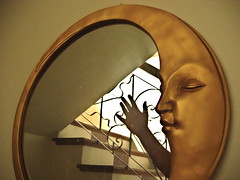Habit. How much of your life is habitual? Personally speaking, I am a creature of habit. Astoundingly so. Every morning I have coffee (black please) in a certain chair (that sticks out just so), I read a certain inspiring book and then the paper. I have a routine for the way I wash my face, my hair, the dishes. I habitually feel insecure at certain times and habitually cope with those feelings in a habitual ways.
"A habit is something you can do without thinking - which is why most of us have so many of them." ~Frank A. Clark
Habits are the things that we do without much conscious awareness. It’s where we are on auto pilot. We’ve all had that weird sensation of diving to work and then not remembering the drive to get there. That’s habit. And from a biological perspective we create the groundwork for our habits in our brains. We strengthen (and even create) neuropathways in the brain by repetition until it becomes second nature. Until we don’t have to consciously think about it anymore. Until it becomes habitual. Think of a child learning to walk. At first they
 work endlessly. It’s a marriage of balance meeting gravity. They teeter on the edge of falling, gripping the edge of a table. They stand. They wobble. Then it’s a quick step forward. Then another. They fall down and try again and again. Repetition. While their brains are mapping the motions, forming neurons, creating pathways. After awhile they just walk; forgetting how hard it was. Walking becomes habit. And from this perspective our habits can certainly help us, even empower us. We walk to get places, to explore life around us. We walk for fun or sport. Walking serves our greater good just as some habitual patterns accomplish the task of taking care of life’s details we may not want or need to focus on. But this is where a discussion of habits gets into sticky territory because much as they give us necessary respite from mundane necessities they can just as easily propel us onto the path of unconscious existence. When our habits become the propelling force of our lives not our genuine expression. When we feel like we are on auto pilot much of the time. When change feels impossible we can begin to feel uninspired, stagnant, and powerless. Habit becomes a blinding loop wherein we fall deeper and deeper into a path of unconscious repetition. Habits can begin to define us and at the same time negate us. Over time we lose ourselves to the habit.
work endlessly. It’s a marriage of balance meeting gravity. They teeter on the edge of falling, gripping the edge of a table. They stand. They wobble. Then it’s a quick step forward. Then another. They fall down and try again and again. Repetition. While their brains are mapping the motions, forming neurons, creating pathways. After awhile they just walk; forgetting how hard it was. Walking becomes habit. And from this perspective our habits can certainly help us, even empower us. We walk to get places, to explore life around us. We walk for fun or sport. Walking serves our greater good just as some habitual patterns accomplish the task of taking care of life’s details we may not want or need to focus on. But this is where a discussion of habits gets into sticky territory because much as they give us necessary respite from mundane necessities they can just as easily propel us onto the path of unconscious existence. When our habits become the propelling force of our lives not our genuine expression. When we feel like we are on auto pilot much of the time. When change feels impossible we can begin to feel uninspired, stagnant, and powerless. Habit becomes a blinding loop wherein we fall deeper and deeper into a path of unconscious repetition. Habits can begin to define us and at the same time negate us. Over time we lose ourselves to the habit."To fall into a habit is to begin to cease to be." ~Miguel de Unamuno
Just as we can forget that drive to work we can habitually grab that bag of chips when we sit down to watch TV. We can habitually light that cigarette after dinner. We can habitually yell at our kid for forgetting their homework again. We can habitually get frustrated with our partner for not giving us what we want. We can habitually say no when we might need to say yes or yes when we need to say no. We can say we will change, quit, do something tomorrow for the hundredth time only to do the same thing the next day.
The question is - is what your doing working? Really? Is your habitual habit effective at all for creating the life you desire? You may think you’re right, vindicated actually, but that means nothing if what you’re doing isn’t working. Because the very definition of insanity is doing the same thing and expecting different results. But habit keeps us doing the same thing. It keeps us in the past, repeating, repeating, repeating. It’s madness. And we wonder why we are frustrated, depressed, or unwell.
"The chains of habit are generally too small to be felt until they are too strong to be broken." ~Samuel Johnson

So a key step to change is awareness. Right now. What is habitual about that thing you want to shift (remember in the last blog you picked one)? Put the spotlight on it. Has in become a blinding loop of habitual response that you have lost creative power to influence because it is so deeply ingrained in your psyche and out of your conscious awareness?
Question your habitual nature. Bring it into the light. Ask…
- When did it start? Where did you learn it? Was it your parents before yours?
- How does it serve you/ How does not?
- Do people around you have the same habits?
- What do you habitually say/think about your issue? Do you have excuses for it?
So this week notice what is habitual about the issue you are choosing to shift. Bring conscious awareness to the parts that are used to being overlooked. Question your issue. Get to know it. Shed light on it. Write about it. Talk about it. That is how we take our power back. That is how we develop the courage to change. In this moment. Then the next moment. Then the moment after that. When we face our habits we can decide what do do with them. We can take our creative power back. We can decide to change them. We can allow our habits to teach us what we need to know about ourselves so we can grow. Because this is the best part about habits. We have a choice to change them. The good news is we can effect change on any situation we do not like in our lives. Anything. We can choose another way at anytime. Now is the moment you can change everything.
"You can’t drop concepts. You can only shine a little flashlight on them as you do inquiry, an you see that what you thought was true wasn’t. And when the truth is seen, there’s nothing you can do to make the lie true for you again."
~ Byron Katie
As always I encourage feedback (comments, questions, etc.) via the comment box or my email...
Next week we go further on our journey of discovering change….stay tuned.



I love the habit of looking forward to your blog now! Thanks for the reminder of 'what serves you'--I can lose track of this!
ReplyDeleteI love everything about this post, your blog, this latest series of topics... I especially love the quotes you pull your topics together with... everything flows and everything is so helpful. It's a sanctuary, really. I truly feel that your blog could easily be compiled into an amazing book... one day. Thank you again for this insightful post... I will appreciate being aware of habits as they pop up for me this week. xoxo
ReplyDelete